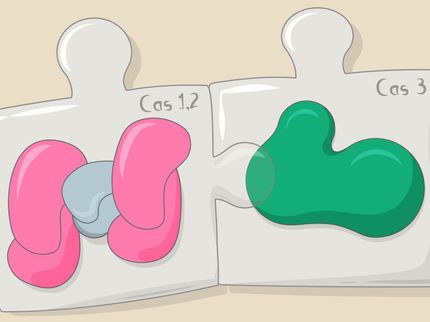Researchers harness DNA as the engine of super-efficient nanomachine
Researchers at McMaster University have established a way to harness DNA as the engine of a microscopic "machine" they can turn on to detect trace amounts of substances that range from viruses and bacteria to cocaine and metals.
"It's a completely new platform that can be adapted to many kinds of uses," says John Brennan, director of McMaster's Biointerfaces Insitute. "These DNA nano-architectures are adaptable, so that any target should be detectable."
DNA is best known as a genetic material, but is also a very programmable molecule that lends itself to engineering for synthetic applications.
The new method shapes separately programmed pieces of DNA material into pairs of interlocking circles.
The first remains inactive until it is released by the second, like a bicycle wheel in a lock. When the second circle, acting as the lock, is exposed to even a trace of the target substance, it opens, freeing the first circle of DNA, which replicates quickly and creates a signal, such as a colour change.
"The key is that it's selectively triggered by whatever we want to detect," says Brennan, who holds the Canada Research Chair in Bioanalytical Chemistry and Biointerfaces. "We have essentially taken a piece of DNA and forced it to do something it was never designed to do. We can design the lock to be specific to a certain key. All the parts are made of DNA, and ultimately that key is defined by how we build it."
The idea for the "DNA nanomachine" comes from nature itself, explains co-author Yingfu Li, who holds the Canada Research Chair in Nucleic Acids Research.
"Biology uses all kinds of nanoscale molecular machines to achieve important functions in cells," Li says. "For the first time, we have designed a DNA-based nano-machine that is capable of achieving ultra-sensitive detection of a bacterial pathogen."
The DNA-based nanomachine is being further developed into a user-friendly detection kit that will enable rapid testing of a variety of substances, and could move to clinical testing within a year.
Original publication
Other news from the department science

Get the life science industry in your inbox
By submitting this form you agree that LUMITOS AG will send you the newsletter(s) selected above by email. Your data will not be passed on to third parties. Your data will be stored and processed in accordance with our data protection regulations. LUMITOS may contact you by email for the purpose of advertising or market and opinion surveys. You can revoke your consent at any time without giving reasons to LUMITOS AG, Ernst-Augustin-Str. 2, 12489 Berlin, Germany or by e-mail at revoke@lumitos.com with effect for the future. In addition, each email contains a link to unsubscribe from the corresponding newsletter.
Most read news
More news from our other portals
Last viewed contents




















































